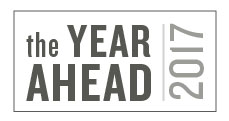January 11, 2017 —  When you look to the year ahead, what do you see? Ensia recently invited eight global thought leaders to share their thoughts. In this interview with Ensia contributor Lisa Palmer for Ensia’s 2017 print annual, author and speaker Andrew Winston responds to three questions: What will be the biggest challenge to address or opportunity to grasp in your field in 2017? Why? And what should we be doing about it now?
When you look to the year ahead, what do you see? Ensia recently invited eight global thought leaders to share their thoughts. In this interview with Ensia contributor Lisa Palmer for Ensia’s 2017 print annual, author and speaker Andrew Winston responds to three questions: What will be the biggest challenge to address or opportunity to grasp in your field in 2017? Why? And what should we be doing about it now?
The business community has moved a long way in recent years. There’s broad acceptance that pursuing sustainability and addressing climate change are good for business. Seeing that general business case, companies have begun to invest in and build a cleaner more sustainable economy, so the biggest opportunity is to keep that momentum going. This quest may become more of a challenge in 2017 if the new administration in the U.S. is hostile to action on climate, clean energy and social justice. But the megatrends driving companies toward resilience, sustainability and clean tech are not going away — and they don’t depend much on government.
For example, thanks to innovation and increasing scale, renewables are often less expensive than fossil fuels — even without subsidies. Many large companies are buying significant quantities of solar and wind power. On top of pro-climate economic trends like these, social pressure on companies to manage environmental and social issues is rising. Millennials want organizations they work for and buy from to pursue more than profit, motivating forward-thinking companies to demonstrate a commitment to a larger purpose.
The challenge for 2017, beyond navigating a radically different U.S. political landscape, is to change our mind-set.Still, the quest for sustainable business faces perennial challenges. Executives feel relentless pressure for short-term results and often believe that sustainability always costs too much. But many things companies do under the banner of sustainability, like eco-efficiency, save money very quickly. Other, deeper changes in a company’s operations, products and supply chains will require investment with possibly longer payback periods. So getting organizational attention for sustainability, especially in what may be a volatile political and economic environment, could still be challenging.
The solution is partly about how we tell the story and think about value. Even though many aspects of business can’t be measured precisely, that doesn’t mean they create no significant business value. What are improved safety, better working conditions, business resilience, employee engagement or customer loyalty worth?
So the challenge for 2017, beyond navigating a radically different U.S. political landscape, is to change our mind-set. If we demonstrate that sustainability drives value, business has an amazing opportunity to lead in the creation of a thriving, equitable world. ![]()
Editor’s note: The views expressed here are those of the author and not necessarily of Ensia. We present them to further discussion around important topics. We encourage you to respond with a comment below, following our commenting guidelines, which can be found here. In addition, you might consider submitting a Voices piece of your own. See Ensia’s “Contact” page for submission guidelines.
Ensia shares solutions-focused stories free of charge through our online magazine and partner media. That means audiences around the world have ready access to stories that can — and do — help them shape a better future. If you value our work, please show your support today.
Yes, I'll support Ensia!


So I wanted to add to the discussion the winners of our 2017 sustainability award: https://sealawards.com/sustainability-award-2017/.
Cheers!